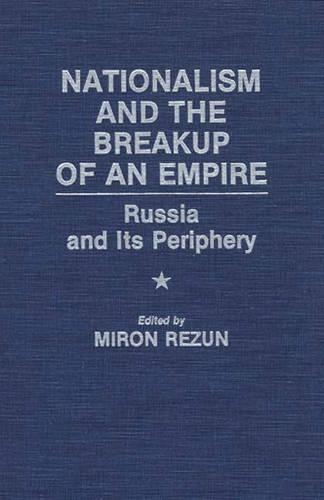
Nationalism and the Breakup of an Empire: Russia and Its Periphery
(Hardback)
Publishing Details
Nationalism and the Breakup of an Empire: Russia and Its Periphery
By (Author) Miron Rezun
Bloomsbury Publishing PLC
Praeger Publishers Inc
30th October 1992
United States
Classifications
Tertiary Education
Non Fiction
320.540947
Physical Properties
Hardback
208
Description
The Soviet polity is presently going through its most difficult transition ever. The Russian Center's point of view is that the crisis is an issue of imperialism: the decline and fall of the old Russian empire, the undoing of the pax Russica, and the derangement of the Russian imperial consciousness. From the viewpoint of the former march-lands of the empire, the issue is nationalism. Since Mikhail Gorbachev launched his reform programme under the rubric of perestroika and glasnost, the most dramatic changes taking place in the USSR have been in the area of ethnic and minority nationalism. The Soviet nationalities problem has become central to the nations of the world, as well as to all minority and national groups. The purpose of this book is to present a comprehensive analysis of the impact of nationalism on the break-up of the Soviet Union, measure the effects of this dissolution, and to examine the remnants and revisions. The authors conclude that the Russian Empire is at the end of its tether, but what will remain will still be a viable world power. The second conclusion is that the so-called "centre" of the empire will be in Russia herself, much more than in the past, and that a new form of "Russian nationalism" is in the making, which could have aggressive and expansionist tendencies. Policymakers, Soviet-area specialists, and students should find this book provocative and useful.
Reviews
Its readability, its helpful select bibliography, and its straightforward presentation make this volume accessible to both a general audience and to undergraduate students of post-Soviet politics and the successor states.-International Journal
"Its readability, its helpful select bibliography, and its straightforward presentation make this volume accessible to both a general audience and to undergraduate students of post-Soviet politics and the successor states."-International Journal
Author Bio
MIRON REZUN, born in Israel, is a Professor of Political Science at the University of New Brunswick in Canada. He received his Ph.D. from the University of Geneva, Switzerland, and has published widely on the Soviet Union and the Middle East. His articles have appeared in Etudes Internationales, the International Journal, Queen's Quarterly, and Problems of Communism. He has edited a book called Iran at the Crossroads: Global Relations in a Turbulent Decade (1990). He has also published Post-Khomeini Iran and the New Gulf War (1991), Intrigue and War in Southwest Asia (Praeger, 1991), and Saddam Hussein's Gulf Wars (Praeger, 1992).
